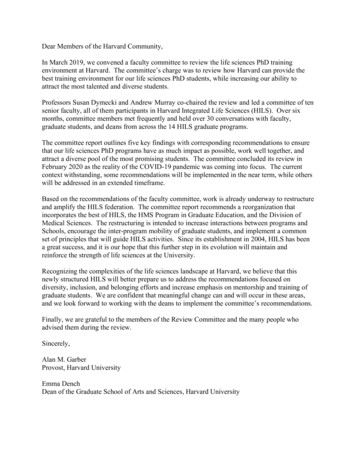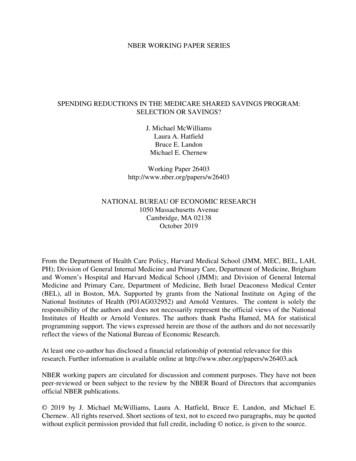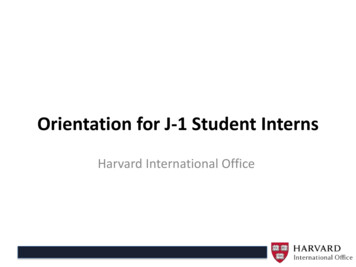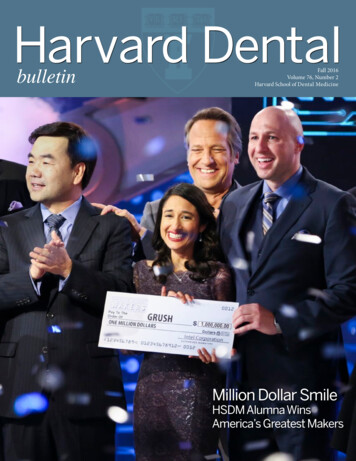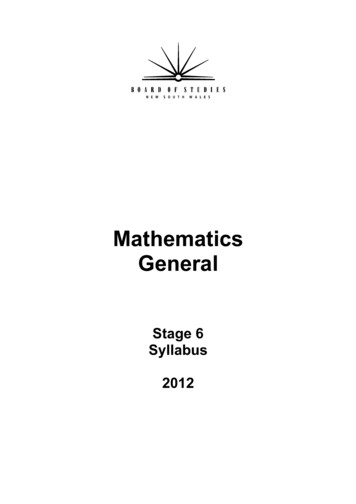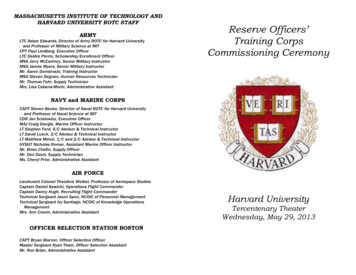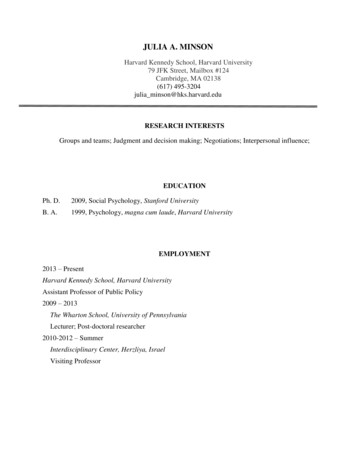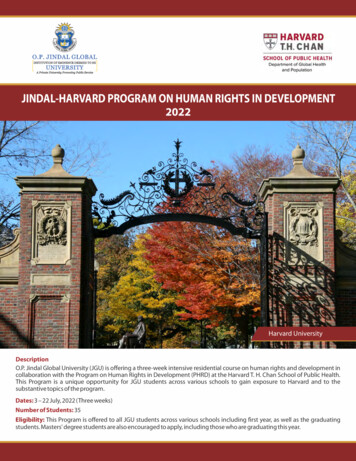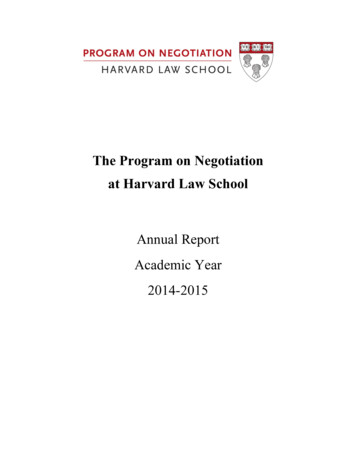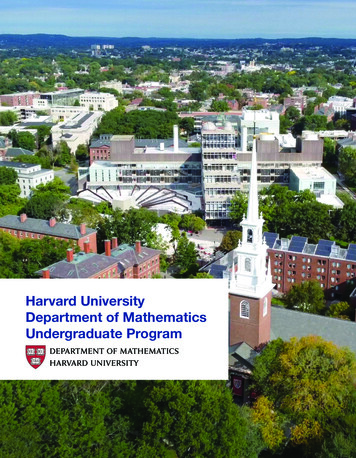
Transcription
Harvard UniversityDepartment of MathematicsUndergraduate ProgramDEPARTMENT OF MATHEMATICSHARVARD UNIVERSITY
Welcome to the Department of Mathematics!This document is for you if you are considering becoming a concentrator in Mathematics, or if you havealready declared and want more information. If you are considering the math concentration and simplywant an overview, this first page might be enough for you. But keep reading if you’d like to know more.Why mathematics? What can you do with it?Overview of requirements and possibilitiesMathematics is the science of order, andmathematicians seek to identify instances oforder and to formulate and understand conceptsthat enable us to perceive order in complicatedsituations.Concentration in mathematics requires aminimum of twelve letter-graded course ofwhich at least eight must be courses labeled asMathematics. The remaining four can be eitherlabeled Mathematics or courses in officiallyapproved related fields. Of the eight (or more)courses labeled as Mathematics, at least onemust be a course in analysis, one must be acourse in algebra, and one must be a course ingeometry/topology.Concentration in mathematics is an excellentpreparation for a mathematics career in eitheracademia, science, industry, secondary schooleducation, finance, law or government. Mostadvanced disciplines rely on mathematics. Forexample, the physical sciences, life sciences,computer science, economics, data science andthe social sciences are all mathematically intensivefields. As a consequence, many mathematicsconcentrators take jobs after Harvard in industry,education, finance, medicine or other professionsthat are not “classically” mathematics. Othershave gone on to professional training in law,business, medicine or actuarial sciences.Roughly a third of our concentrators go on topursue a graduate degree in mathematics or aclosely related field such as computer science orstatistics.Students are also required to fulfill the MathExpository Requirement, by submitting a 5-pageexpository paper on some approved mathematicssubject by the end of the third year at Harvard.A candidate for high or highest honors inMathematics must submit a senior thesis. Thethesis can be on any topic in pure or appliedmathematics that is not directly covered in yourcourse work. It should be an original expositionof material culled from multiple sources. Notethat most theses do not contain new “theorems.”A student who wishes to be considered forstraight honors (neither high nor highest) caneither submit a senior thesis or take four extracourses (above the required twelve courses) inMathematics or approved related fields.A Harvard degree with a concentration inMathematics opens just about any professionaldoor. The mathematics concentration is also veryflexible with regards to electives, allowing youto pursue multiple interests during your time atHarvard.Some students participate in the ConcurrentMasters program in their fourth year at Harvard tograduate with a Master’s Degree in Mathematics.Joint concentrations with other departments arefrequent, with Mathematics as either the primaryor allied field. If you are tangentially interestedin Mathematics, consider a secondary field inMathematical Sciences. The requirements arerelatively broad and not difficult to fit in withanother concentration.So many options! To know more, read on.Concentrators enjoy a department lunch with Professor Elkies.1
Requirements for the Mathematics ConcentrationKeep in mind: You will need to learn to read and write mathematics proofs in order to benefit from higherlevel mathematics courses. You should learn to do this by the end of your second year. Many coursesdirectly teach this skill: any or all of Math 101, 112, 121, 130 if you take Math 21; or one of Math 22, 25if you don’t take Math 21.Let’s start with your math placement test: please do follow it. This table explains what we suggest youtake, depending on your placement. If you want to try something different, or if you have any questionsor doubts about your placement, please reach out: our contact info is on the last page.For details on courses numbered 18 to 101: matics.pdf.PlacementMath M, 1Math18, 19, 21What you should take firstWhat you can take nextStart with your placement, and takeup to and including 1b.Take 21a,b. Concurrently, take Math 101, orsee next row of this table.If you are not sure you have a stronginterest in math, but want to keepmore options open: take 21a,b,and consider taking Math 101concurrently.Consider any combination of: Math 101;Math 112 (real analysis); Math 121 (linearalgebra); Math 130 (classical geometry).These teach proof-writing skills.Also accessible: Math 152 (discreteIf you have already started or takenmathematics) and Math 157 (Math in theMath 18 or 19, consider Math 101World).and come in to talk to us.Math 122 (1st course in abstract algebra).Math 22, 25Or Math 55If you have a strong interest in math, After (or with) 122, consider Math 131start with 25a,b.(topology) or Math 114 (measure, integrationand banach spaces).For a fast-paced, challenging coursethat covers more topics more deeply Math 114, 131, 123, 132.than 25, take Math 55a,b.Math 101 is strongly suggested (if not taking 22, 25 or 55). It offers a taste of higher math-ematics,introduces you to proofs, and also to the main branches of mathematics – a great way to gaugewhether you are interested in the math concentration!You can find more information about “how to structure a good program” in the section of the same nameof this pamphlet: ematics.pdf. This pamphletalso has a section containing sample programs, depending on your placement and interests.For information on placement test scores and calculus courses, we have special placement advisingoffice hours at the beginning of each semester, see here: http://math.harvard.edu/freshmen/“I was scared about taking my first class that required writing proofs. Everyone is. But you quicklyrealize that writing proofs is just formalizing the understanding that you have. So it just comesnaturally as you’re learning.”Professor Eli Grigsby was a math concentrator at Harvard and is now tenured at Boston College.2
Requirements for the Mathematics ConcentrationCore courses are in bold: they teach basic skills needed for a lot of higher math. Not required, butstrongly suggested.It is important to get to know the three main branches of mathematics: analysis, algebra and geometry.More advanced material often reaches across these branches, and tools and intuition from each branchmight be useful in another. Because of this, the department requires you take at least one course ineach one of the three main branches (analysis, algebra, geometry) for your concentration.This breadth requirement applies to joint concentrators, but not if you are doing a secondary field in themathematical sciences. Note that Math 101 can count as a course towards one of these branches forthe math and teaching option. We still encourage you to sample as many of these branches as you wish!Analysis: The concept of function provides us with the means to study dependence and change. Thestudy of functions, often in connection with the limit concept, is called analysis. The most effectivetool for this study is the infinitesimal calculus that analyzes the relation between functions and theirderivatives.Math 110Math 112Math 113Math 114Math 116Math 117Math 118rVector Space Methods for Differential EquationsIntroductory Real AnalysisAnalysis I: Complex Function TheoryMeasure, Integration and Banach spacesReal Analysis, Convexity, and OptimizationProbability, Random Processes, Economic ApplicationsDynamical SystemsAlgebra: The study of number systems and their generalizations is called algebra. Here the primaryconcepts are group, ring, field, and module.Students may cross-registerMath 121Linear Algebra and Applicationsfor courses at MIT. Get priorMath 122Algebra I: Theory of Groups and Vector Spacespermission from the math DUSMath 123Algebra II: Theory of Rings and Fieldsif you want such a course toMath 124Number Theorycount for concentration credit.Math 129Number FieldsGeometry/Topology: Geometry goes far beyond the classical study of the space we live in to includespaces of high dimension and topology, the abstract theory of shape.Courses offered areMath 130Classical Geometrysub ject to change.Math 131Topology I: Topological Spaces and the Fundamental GroupThe course catalogMath 132Topology II: Smooth Manifoldscontains our fullMath 136Differential Geometryofferings.Math 137Algebraic GeometryOther: Important subjects of mathematics do not fall within the three main branches of mathematics butare worthwhile to study.Math 141, 145 Logic CourseMath 153Mathematical Biology and Evolutionary DynamicsMath 154Probability TheoryMath 155rCombinatoricsMath 157Mathematics in the WorldNot sure about Math yet? Math121, 122 and 112 provide usefultools for many other disciplines.Math 91r is a reading course for students who want to learn a particular topic not covered in a regularcourse or tutorial: ematics.pdf.3
Requirements for the Mathematics ConcentrationCourse Requirements 8 letter-graded courses in Mathematics (Mathematics Ma and Mb together count as one course ofconcentration credit, as do Math Qa and Qb), not cross-listed, at least 4 of which must be at the 100level and satisfy the breadth requirement mentioned on the previous page. 4 letter-graded courses in either Mathematics or a related subject. Numerous courses in AppliedMathematics, Computer Science, Economics, Engineering Sciences, Physics, Applied Physicsand Statistics count towards this requirement. Other departments also have a handful of approvedcourses. The Student Handbook contains all the details. A 5-page expository paper in mathematics, written in secondyear or before the end of the third year reading period, underthe supervision of a professor or tutor in a tutorial (Math 99r),a reading course (Math 91r), or a 100- or 200-level course thestudent is enrolled in. Students enrolled in a tutorial satisfythis requirement as part of the tutorial.Tutorials are encouraged becausethey are taught in a small class bya graduate student – a completelydifferent experience from typicalclasses!One Freshman Seminar can be substituted for one of the twelve letter-graded courses listed above,provided: it is taught by Department of Mathematics faculty; it is not used to satisfy the breadthrequirement; permission is obtained from the Director of Undergraduate Studies before the approval ofthe Plan of Study.Requirements for Honors Mathematics ConcentrationA candidate for high or highest honors in Mathematics must submit a senior thesis in addition to the otherrequirements. The thesis should be an original exposition of material in pure or applied mathematicsculled from several sources. Note that it need not contain original mathematical research. A student whowishes to be considered for straight honors (neither high nor highest) can either submit a senior thesis ortake four extra courses (above the required twelve courses) in Mathematics or approved related fields.The department strongly urges concentrators to write a senior thesis; this provides a much betterglimpse of mathematical research and graduate work than taking courses, and is also great forstudents who prefer independent learning. More about senior theses can be found in the pamphlet“Honors in Mathematics”: matics.pdf.Concentration AdvisingThe department assigns all concentrators a faculty member as their concentration advisor. Your advisorcan help you plan your coursework, and will sign your Crimson Cart. How much contact you have withyour advisor and how helpful they are will depend almost entirely on your initiative. Drop by during theiroffice hours or during our 4pm tea and cookies (see under Activities), or invite your advisor to lunchat your House. Your advisor can also help you choose a thesis topic, a thesis advisor, learn aboutmathematical research, and apply to graduate school. If you would like to change your assignment,please talk to Cindy Jimenez in SC 334 (cindy@math.harvard.edu).The department also has every third year student come in for a scheduled 20 minute advising sessionwith two faculty members in the spring semester; post-graduate options and senior theses are oftendiscussed. Third year students will receive an invitation letter by email in the spring from Cindy Jimenez.We offer the AB-AM degree, for Math concentrators to obtain a Masters degree (AM) in Mathematicsin addition to their Bachelors degree (AB) during their four years at Harvard. For details, see thecorresponding pamphlet: Masters-Programin-Mathematics.pdf.4
Combining Mathematics With Another DisciplineThere are many ways to combine your mathematical interests with other academics.Joint ConcentrationsJoint concentrations with other departments are not only possible but very common. Joint concentrationsare honors only. If Math is the primary field, the student must fulfill the requirements for Honors in Math(see previous page) plus whatever other requirements are called for by the allied department. If Math isthe allied field, the Math requirements are as follows: five letter-graded courses in Mathematics with agrade of C or higher and averaging at least B ; at least three of those courses must be at the 100-leveland must satisfy the breadth requirement (see previous page); no senior thesis required; no expositorypaper required either.Mathematics and Teaching OptionThe Math and Teaching Concentration option is currently not available due to the recent reorganizationof the Harvard School of Education (this option had a significant HSE component). Talk to the MathDirector of Undergraduate Education if you are interested in a possible career in K-12 teaching.Secondary Field in the Mathematical SciencesIf you’d rather concentrate in another discipline, but still take math or “mathy” courses and be recognizedfor it, you can do a secondary field! Requirements are four courses (for a letter grade, grade of C- orabove) in mathematics, applied mathematics or statistics, of which at most two can be in statistics. Themath and applied math courses must be numbered 104 or higher; statistics courses must be numbered109 or higher. Details are in the Student Handbook.“I chose to study math because of theextraordinary interconnectivity of thesubject. The theory goes very deep, andthe farther you go in your studies, the moreconnections you draw. I love the way thatthings seem to piece together nicely inmathematics, and the things you proveare true will always be true. Studying mathtakes a lot of patience, and I think the firstyear is especially hard, depending on one’sexperience of math in high school. If you areconsidering math, make sure to think givethe problems time. The more you do math,the easier approaching these problems willbe, even if the material gets more difficult.”“Math is beautiful! From simple principlesone can deduce a broad range of interestingfacts using nothing more than the trappingsof logic. Math consistently challenges meto think hard, solve problems, and learnexciting theories that really stretch theimagination!”Jeffrey Ling, Computer Science and Math, Class of 2017“The problem-solving techniques youlearn in math are incredibly helpful in otherdisciplines. Studying math has made me abetter computer scientist, statistician, andthinker.”Mark Yao, Mathematics, Class of 2016Kat Zhou, Mathematics, Class of 2017“Math is so useful, teaches you to thinklogically and rigorously, is highly rewardingand transferable, makes a great resume,and allows you to take so many electives.”“Exploring math allows you to reallyunderstand how all the sciences work andappreciate the beauty of what humans havediscovered.”Jeffery Durand, Mathematics, Class of 2017Vikram Sundar, Mathematics, Class of 20175
ActivitiesDue to Covid-19 restrictions, in person activities might be limited for the fall 2022 semester.Math Department Welcome PartyGender Inclusivity in Math student groupAt the beginning of the fall semester the MathDepartment holds a party in the Austine & ChiltonMcDonnell Common Room on the 4th floor ofthe Science Center. Please come and meet othermath concentrators, faculty members, mathgraduate students, and our staff. Refreshmentsprovided.The Gender Inclusivity in Math (GIIM) studentgroup is dedicated to creating a community ofmathematicians supportive of women interestedin math. They have social events, a speakerseries, a fantastic conference, a great advisingpamphlet, and more: harvardgiim.org.Math NightEvery spring the math department holds aninformal meal to welcome second year studentswho have declared math as their concentration. Afew upper-year students and faculty are presentso you can ask them about the concentration.The Math Table meets Tuesdays 5:30pm in roomSC507 in the Science Center over dinner to heartalks, mostly by undergraduates. Anyone, at anylevel of math literacy, is welcome. Talks generallycover topics which fall outside the scope of regular courses. The talks serve three purposes: tointroduce undergraduates to various fields ofmath, to suggest topics for a senior thesis, andto provide a forum for undergraduates to delivermath talks. The Rogers Prizes are awarded yearlyfor the two best talks delivered by undergraduates.Details here: omen in MathThe Common RoomThis group hosts monthly lunches for womenidentified members of the department, includingconcentrators. We try to add new femaleconcentrators to this mailing list as they comein, but please contact us if you would like to beadded.The Austine & Chilton McDonnell CommonRoom (4th floor of the Science Center) is opento math concentrators and friends of the MathDepartment. Tea and cookies are served at 4pmMonday through Wednesday (occasionally onThursday). Cheese, bread, and juice are offeredat 4:15 or so on Fridays.Math TableDuring Math Night you can find friends from yourmath class, work on problem sets and get helpfrom your course assistant. Extra special food isserved! Location to be announced at the start ofthe fall semester, Mondays 8-10pm.Second Year Students Welcome PartyMath CompetitionsThe Mathematics LibraryEach year undergraduates across the nationcompete in the Putnam Math Competition, anexamination given in two 3-hour sessions inearly December. There are substantial prizes.Sign up to participate in late September onthe bulletin board opposite room 323. Otherfantastic competitions are the team-basedMathematical Contest in Modeling (MCM) andthe Interdisciplinary Contest in Modeling (ICM)that occur in late January.The Birkhoff Mathematics Library on thethird floor of the Science Center holds manymathemat- ical books and journals. Textbooksused in math courses are held on reserve there.It is a noncirculating library; its resources maybe used only on the premises. Open Mondaythrough Friday 9am-5pm.Math Department LuncheonsThe Harvard Math Department prides itself onits informal atmosphere. Come to these eventsregularly, and get to know other concentrators, thefaculty, and graduate students. Math concentratorsmay request card access to the department fromthe Main Office, SC 325.Held roughly every two weeks, these departmentwide catered lunches occur in the common room,and are open to all members of the department,including concentrators. Please join us!6
Jobs Internships Study AbroadCourse AssistingSummer ResearchThe Math Department hires undergraduates ascourse assistants (CAs). A CA grades homeworkassignments, leads a section once a week, holdsoffice hours and attends the lectures. Hiringfor these positions takes place 1-2 monthsbefore each term. For more information on CApositions (for the calculus courses as well as theupper-level courses), go to: /.There are opportunities to do pure or applied mathduring the summer. Browse the undergraduatebulletin boards near rooms 320 and 503.The Harvard Office of Undergraduate Researchand Fellowships also hosts residential researchprograms over the summer. PRISE is probably theone that aligns most with mathematical ies/browse-uraf-opps/research.The National Science Foundation (NSF)sponsors a number of Research Experiences forUndergraduates (REU) programs in mathematicsevery year. You may wind up learning somethinginteresting, and making money! ams.org/education/emp-reuStudy AbroadThe Office of Career Services can helpyou arrange to spend a semester or a yearstudying abroad. Consider the well-regarded“Budapest Semesters in Mathematics” and thenewer “Budapest Semesters in MathematicsEducation”; both programs are held in Hungary.Large companies often hire undergraduates todo research (usually somewhat applied math)during the summer. Reach out directly to thecompany very early (December is not too early)and look for advertisements posted on theDivision of Engineering and Applied Sciences’bulletin boards.The programs allow students to spend oneor two semesters respectively studyingcombinatorics, algebra, and discrete math, orstudying the teaching of mathematics using astudent-centered approach, in small groups withsenior Hungarian mathematicians. All classesare taught in English. For more information visitbudapestsemesters.com or bsmeducation.com.The math department usually holds an infosession on summer research in early December.More info here: aduate-research/. Also,check with the Harvard Office of Career Services.Interested in graduate school? For moreinformation see pamphlet “Graduate Schoolsand Fellowships in Mathematics” at lowships-in-Mathematics.pdf.A Women in Math lunch with undergraduates, graduate students, post-docsand faculty. See “Activities” page for details.7
Contact UsMath-related events of general interestInterested in math? Forward your email address, name and year atHarvard to Cindy Jimenez in order to receive information about m.Advising FortnightThe department hosts an “open house” in the common room withrefreshments, and also special walk-in office hours. More info: lds-of-study.Undergraduate Bulletin BoardsProfessor Cliff TaubesDirector of Undergraduate StudiesScience Center 504chtaubes@math.harvard.eduInformation about tutorials, jobs, graduate schools, fellowships, andother matters is posted on the Undergraduate Bulletin Boards oppositerooms 320, 427 and 503.Monthly Math MemoA newsletter sent to math concentrators.Information sessions on writing a senior thesisSessions happen every year, one in the early fall for fourth year studentscurrently writing a thesis and one in the late spring for second or thirdyear students who want to know more about writing a thesis). Answersto commonly asked questions can be found here: matics.pdf.Senior Lecturer Wes CainAssistant Director of UndergraduateStudiesScience Center 515jcain2@math.harvard.eduPreceptor Dusty GrundmeierAssistant to the Director ofUndergraduate StudiesScience Center 505hdeg@math.harvard.eduThe department hosts a welcome lunch for new sophomore concentrators every year after they declareconcentration. A few upper-year students and faculty are also invited, to share advice and answer questions.Social Media: @HarvardMathDepartment of Mathematics Website: www.math.harvard.eduHarvard College Student Handbook: handbook.college.harvard.eduCindy JimenezUndergraduate Studies CoordinatorScience Center 334cindy@math.harvard.edu8
1 Oxford StreetCambridge, MA 02138, USA(617) d.edu@HarvardMath
8 letter-graded courses in Mathematics (Mathematics Ma and Mb together count as one course of concentration credit, as do Math Qa and Qb), not cross-listed, at least 4 of which must be at the 100 level and satisfy the breadth requirement mentioned on the previous page. 4 letter-graded courses in either Mathematics or a related subject.

